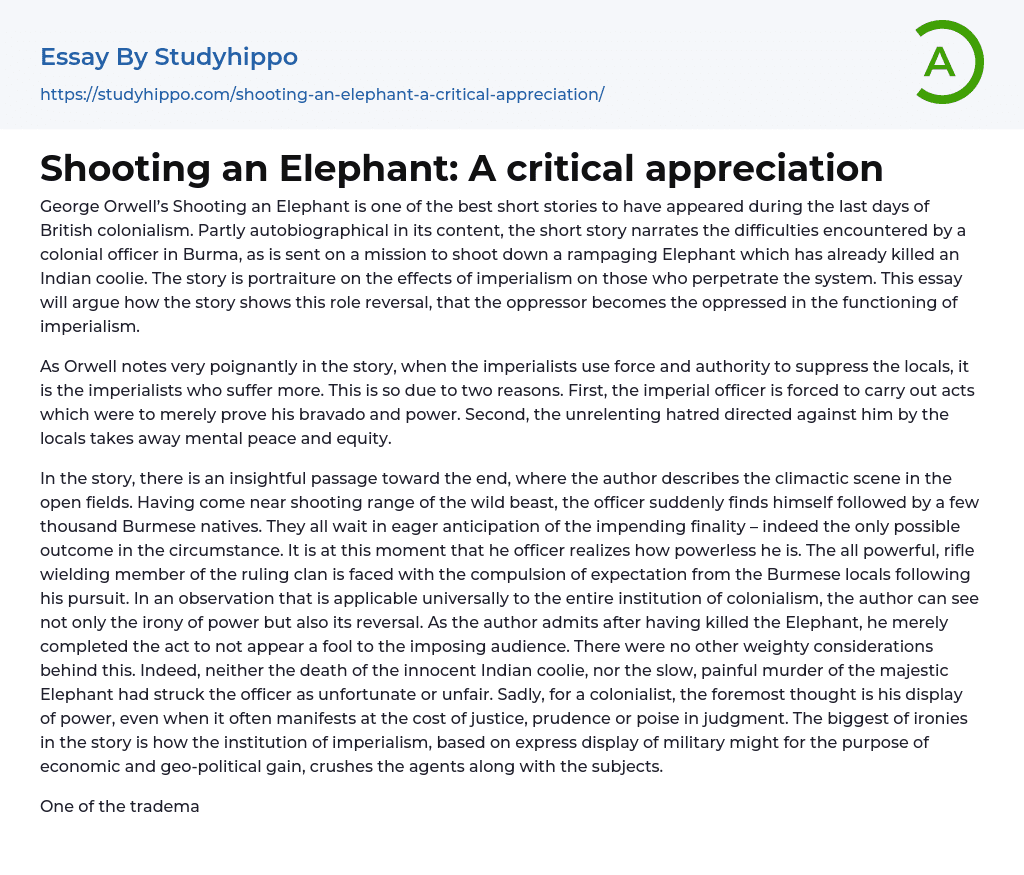

Shooting an Elephant: A critical appreciation Essay Example
George Orwell's Shooting an Elephant is a highly regarded short story from the final days of British colonialism. This partly autobiographical tale recounts the challenges faced by a colonial officer in Burma, who is tasked with shooting an out-of-control elephant that has already taken the life of an Indian laborer. The story serves as a depiction of the impact of imperialism on those responsible for upholding the system. This essay will discuss how the narrative illustrates the reversal of roles, where the oppressor becomes the oppressed within the workings of imperialism.
According to Orwell's poignant observation in the story, the imperialists bear the brunt when they employ force and authority to suppress the locals. This is primarily because the actions they are compelled to perform are solely intended to demonstrate their courage and dominance. Additionally, the relentless animosity from t
...he locals deprives them of mental serenity and fairness.
In the story, the author examines the climactic scene in the open fields where the officer is followed by thousands of Burmese natives, anxiously awaiting the inevitable outcome. This moment reveals the officer's realization of his powerlessness, despite being armed with a rifle and belonging to the ruling clan. The author believes this observation applies universally to colonialism, highlighting the irony and reversal of power. The officer admits that his only motive for killing the Elephant was to save face in front of the audience, without considering the consequences or fairness of his actions. Sadly, colonialists prioritize displaying power over justice, prudence, and sound judgment. The story's biggest irony lies in how imperialism, which relies on military might for economic and geopolitical gain, ultimately oppresses both its agents an
subjects.
Orwell's biographical and fictional works are known for his acknowledgment and admiration of hard facts. In Shooting an Elephant, he highlights the fundamental truth of the inherent wickedness and immorality found in the imperialist endeavor. The narrator openly expresses that his role as a police officer allowed him to directly witness the "dirty work of Empire." Additionally, the story presents another perspective by illustrating that the agents of the empire, who are assigned to various colonies, themselves become victims. They endure long voyages across the seas and spend extensive periods in foreign lands, separated from their homes and families. Consequently, the plight of colonial officers is even more distressing than that of their subjects.
Reference: Orwell, George (1968) [1958]. Selected Writings. Heinemann Educational Books. ISBN 0-435-13675-5.
George Orwell’s Shooting an Elephant is a remarkable short story that emerged towards the end of British colonialism. It draws on Orwell's personal experiences and recounts the challenges faced by a colonial officer in Burma. Assigned with the task of killing a rampaging Elephant that had already taken the life of an Indian coolie, the story reveals the impact of imperialism on its agents. This essay aims to demonstrate how the story highlights the role reversal, where the oppressor becomes the oppressed within the workings of imperialism.
According to Orwell's poignant observation in the story, the imperialists who use force and authority to suppress the locals end up suffering more. This is because of two reasons. Firstly, the imperial officer is compelled to perform acts that only serve to demonstrate his bravery and power. Secondly, the constant animosity from the locals deprives him of inner tranquility.
- Values of Life essays
- Ethical dilemma essays
- Normative Ethics essays
- Virtue Ethics essays
- Belief essays
- Deontology essays
- Moral essays
- Virtue essays
- Work Ethic essays
- Acceptance essays
- Age Of Enlightenment essays
- Child Observation essays
- Confucianism essays
- Conscience essays
- Critical Reflection essays
- Destiny essays
- Determinism essays
- Empiricism essays
- Environmentalism essays
- Epistemology essays
- Ethics essays
- Ethos essays
- Existence essays
- Existentialism essays
- Fate essays
- Free Will essays
- Functionalism essays
- Future essays
- Good And Evil essays
- Human Nature essays
- Individualism essays
- Meaning Of Life essays
- Metaphysics essays
- Natural Law essays
- Personal Philosophy essays
- Philosophers essays
- Philosophy Of Life essays
- Political Philosophy essays
- Pragmatism essays
- Reality essays
- Relativism essays
- Teaching Philosophy essays
- Time essays
- Transcendentalism essays
- Truth essays
- Utilitarianism essays
- Cuban Missile Crisis essays
- Fidel Castro essays
- French Revolution essays
- Han Dynasty essays



